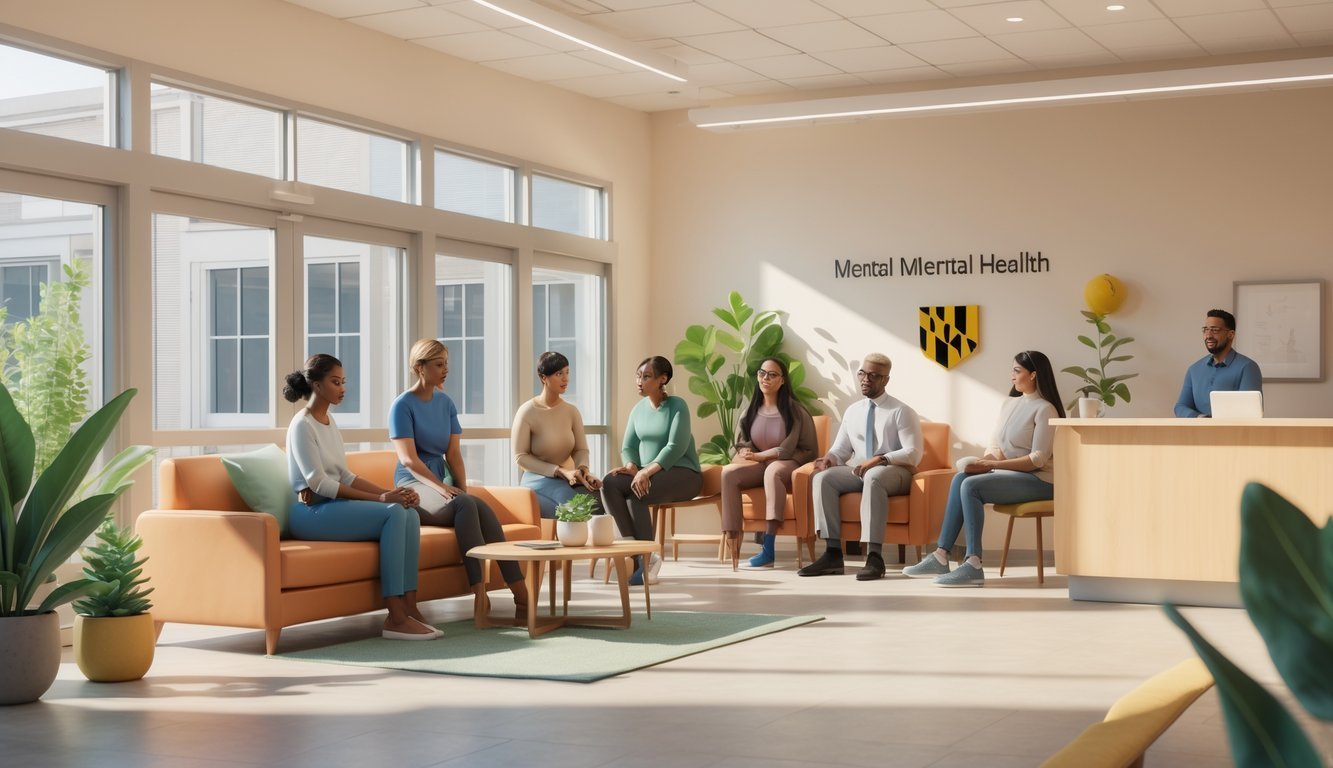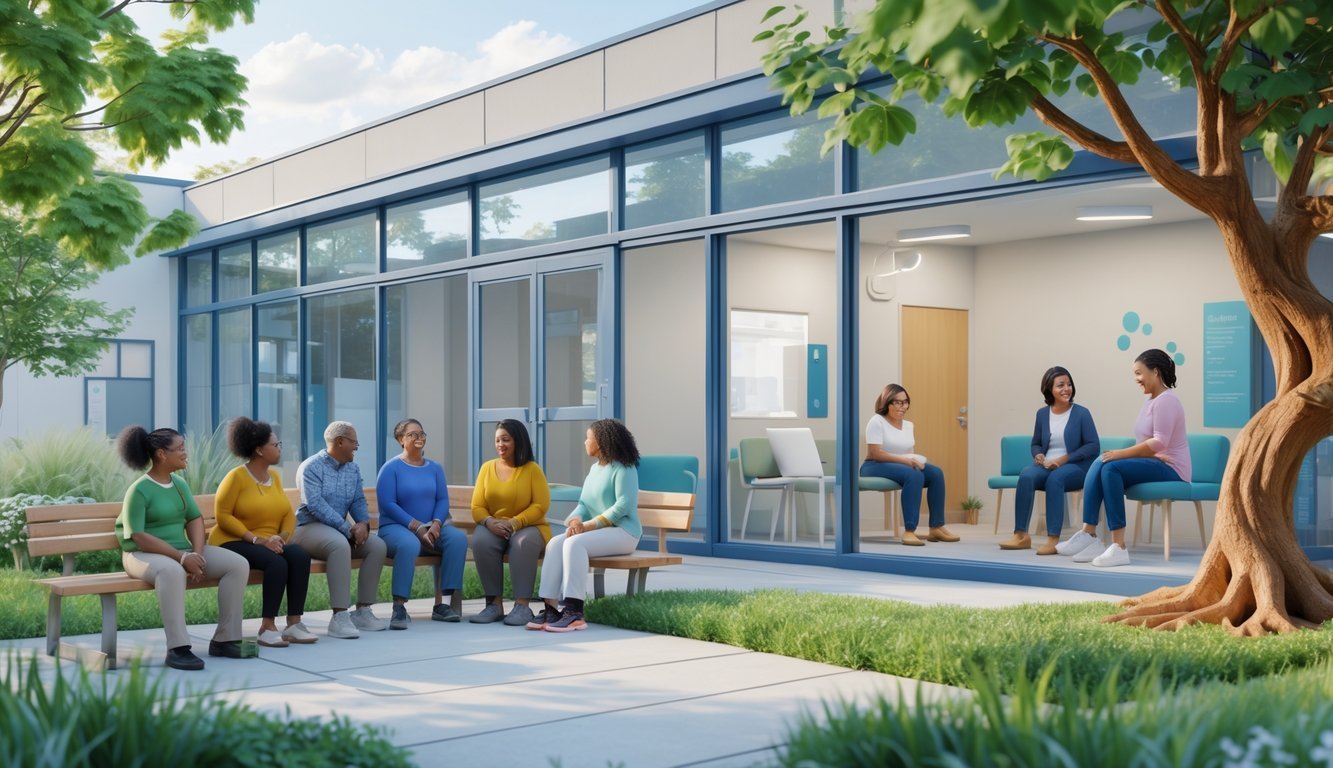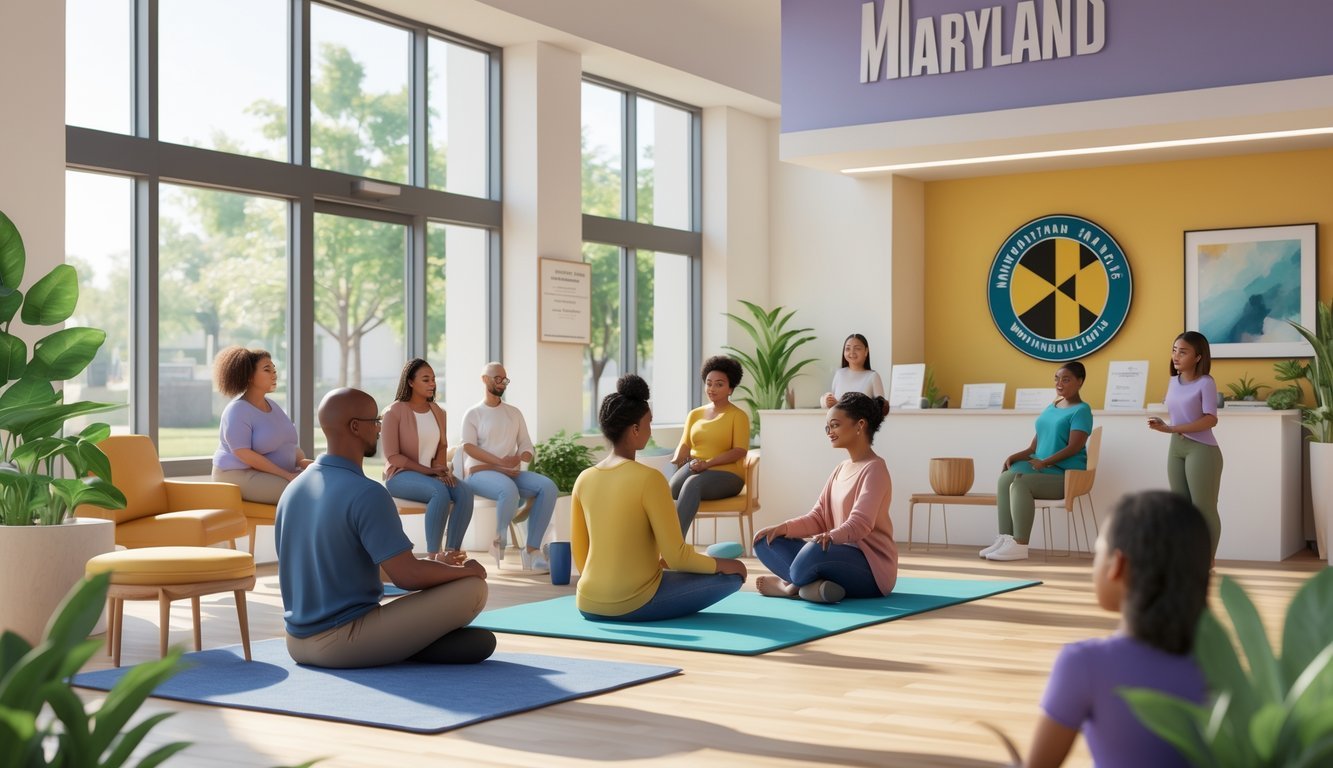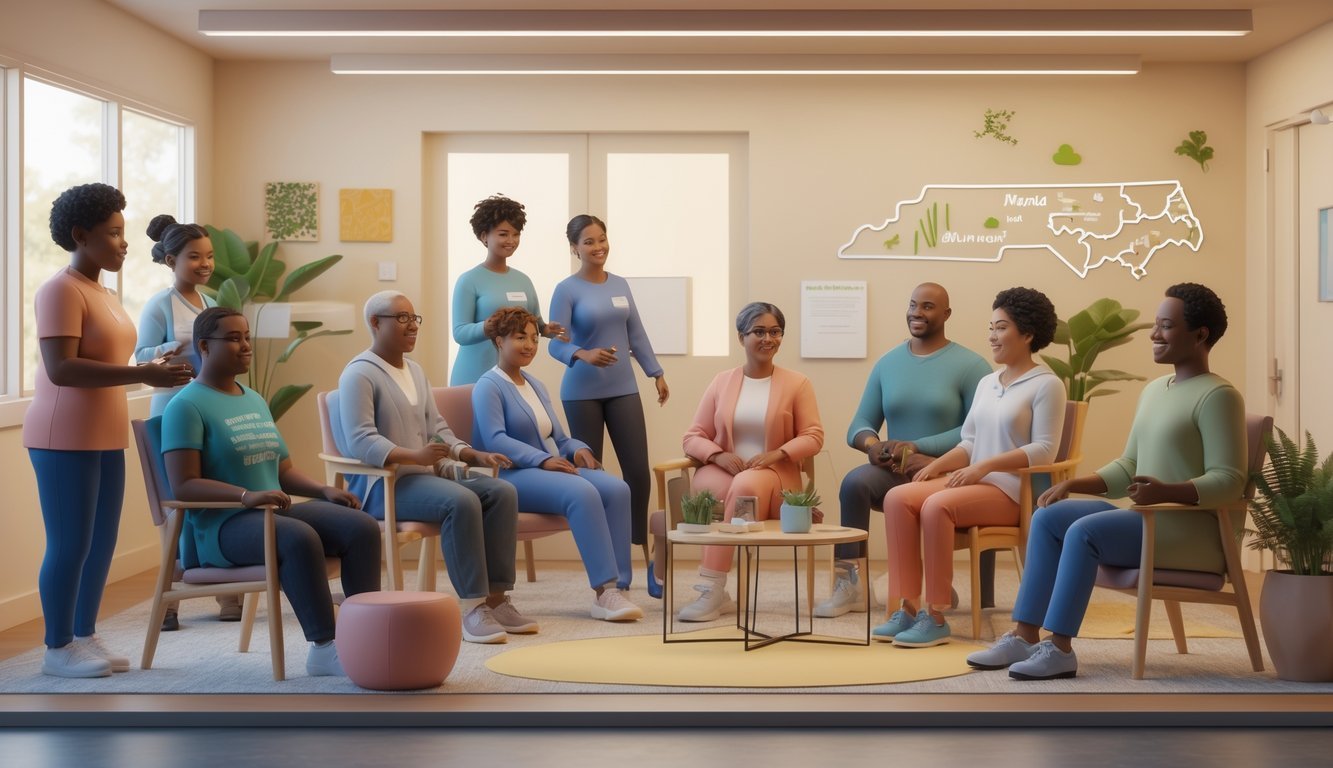PsychNewsDaily Publishers
100 Summit Drive
Burlington, MA, 01803
Telephone: (320) 349-2484
PsychNewsDaily Publishers
100 Summit Drive
Burlington, MA, 01803
Telephone: (320) 349-2484
Maryland offers extensive mental health services, including counseling, crisis support, and specialized programs for youth, veterans, and seniors through community centers and universities.

Maryland has plenty of free mental health services, making it easier for residents to get care without worrying about the cost. You’ll find access to community mental health centers, crisis support, university counseling, and a bunch of organizations offering specialized help throughout the state.
If you’re looking for help, Maryland’s mental health system gives you several ways in. The Maryland Department of Health funds community programs that focus on different groups, including youth and veterans.
Universities play a big part too. Schools like the University of Maryland offer sliding-fee scale services and confidential behavioral health support.
Whether you need someone to talk to right now or want ongoing therapy, Maryland’s network of free resources can help. Knowing what’s out there and how to get started can mean the difference between going it alone and getting the support you need.

Maryland gives you a mix of free mental health services, including counseling, crisis support, and peer-led recovery programs. These options cover everything from regular therapy to urgent situations.
Free counseling means you can get professional help without worrying about cost. This includes one-on-one therapy, group counseling, and programs for specific issues.
Community mental health centers across Maryland accept Medicaid and offer walk-in appointments. Most places ask you to show up before 10:00 AM for same-day visits.
Evening and weekend options include:
Some centers run special programs for certain mental health conditions. Treatment styles can differ, but you’ll usually find cognitive behavioral therapy and group sessions.
Counselors work with you to make a treatment plan that fits. Services often focus on depression, anxiety, substance use, and other common concerns.
Crisis intervention gives you help right away during a mental health emergency. These programs run 24/7, so someone’s always available.
Maryland’s crisis hotlines connect you to trained mental health professionals. You can call if you’re facing intense symptoms or having thoughts of suicide.
Crisis services usually include:
Mobile crisis teams come out to help during emergencies in your community. They can do on-site assessments and step in when things get tough.
Walk-in crisis centers give you face-to-face help during the day. Some offer short-term crisis stabilization if you need more support fast.
Peer support programs link you with folks who’ve been through similar mental health struggles. These services focus on recovery and keeping you well in the long run.
Maryland’s peer recovery specialist training programs prepare people to support others using their own lived experience.
Peer support services involve:
Rehabilitation programs teach daily living skills and help you stay independent. You might find job training, housing help, or social skills classes.
Support groups meet regularly at community spots all over Maryland. These groups give you a way to connect with others who get what you’re going through.
Plenty of peer programs run through local organizations and mental health centers. You can get in touch directly or ask for a referral.

A handful of major organizations in Maryland offer free mental health support using different methods. You’ll find advocacy groups, volunteer counselor networks, community clinics, and crisis programs funded by the government.
The Mental Health Association of Maryland works as the state’s main advocacy group for mental health. They connect people to resources and run educational programs across Maryland.
They keep a big directory of free and low-cost services. You can check their database online or call their helpline for help.
What they offer:
They team up with local chapters in big counties, making it easier to find something close to home or work.
Lots of licensed therapists and counselors in Maryland volunteer through pro bono programs. These programs connect you with mental health professionals for free individual therapy.
Graduate Training Clinics are another option. Psychology and social work students offer therapy under supervision. University of Maryland’s Behavioral Health Services runs one for students and the community.
Religious Organizations often sponsor free counseling too. Churches, synagogues, and mosques work with counselors to offer support, no matter your background.
Professional Association Programs match you with therapists who donate a few hours each month. The Maryland Psychological Association and Clinical Social Work Association organize these efforts.
Federally Qualified Health Centers (FQHCs) in Maryland provide free mental health care based on income. They offer therapy and medication management.
County Health Departments run clinics in most counties. If your income is low enough, you’ll usually qualify for free services.
Local hospitals sometimes run mental health programs for the community. These might include support groups, crisis counseling, and short-term therapy at no cost.
Community Centers often team up with mental health organizations. Senior centers, rec centers, and libraries host support groups and other mental health events.
Maryland has a crisis hotline system that gives you immediate mental health support all day, every day. These services are free and confidential.
Maryland Crisis Hotline: 211 puts you in touch with crisis counselors and emergency services nearby. It’s there for urgent mental health needs.
County Crisis Teams respond to emergencies in your area. Most counties have mobile crisis units that can meet you wherever you are.
Emergency Departments at hospitals in Maryland do psychiatric evaluations and crisis stabilization. They’ll treat you regardless of your ability to pay, though you might get a bill you can negotiate based on your income.

Maryland runs programs for different age groups and communities. These services get tailored to fit the needs of each group.
Kids and teens in Maryland can use behavioral health services made for young people. These programs focus on the unique challenges children and teens face.
You’ll find services like:
Younger kids often use play or art therapy. These approaches help them share feelings they can’t always put into words.
Teen programs often tackle anxiety, depression, and peer pressure. Counselors who get adolescent issues lead these sessions.
Parents usually join in treatment planning. That way, support stays consistent between home and therapy.
Many Maryland schools have mental health programs on campus. This makes it easier for students to get help without missing class.
Maryland offers special mental health services for older adults through state and community programs. These services target the needs of people as they age.
Focus areas include:
Older adults often deal with things like retirement or health changes. Counselors with experience in these transitions can make a real difference.
Programs might include group activities to help seniors build social ties. Reducing loneliness is a big goal here.
Some services combine mental health and medical care. That’s important for older adults juggling a few health issues at once.
Family education programs teach adult children how to support aging parents. They cover warning signs and ways to communicate better.
Maryland recognizes that veterans and service members have unique mental health needs. Specialized programs get built with military culture and experiences in mind.
These services often include:
Many programs use proven therapies like cognitive processing therapy to treat trauma. Peer counselors who’ve served in the military often lead groups, which helps build trust.
Programs also address military sexual trauma and moral injury. These topics need counselors who really get the military context.
Family programs help spouses and kids handle deployments and the return home. These services support the whole military family.
Finding free mental health care in Maryland means knowing where to look and what you’ll need. The state gives you several paths, from county programs to community centers and special clinics.
Maryland’s behavioral health resources directory lists local mental health and substance use providers.
Start by contacting your local health department. Every county runs its own programs with different services.
The Maryland Department of Health operates state hospitals like Springfield Hospital Center. These serve people with serious mental illness from counties like Baltimore City, Carroll, Howard, and Montgomery.
University clinics are another option. The UMD Psychology Clinic offers sliding-fee services for all ages in suburban Maryland and DC.
Call 211 if you need help right away. This free line connects you to local mental health resources 24/7.
Most free mental health services in Maryland use income-based eligibility. You’ll need to show proof of low income or financial hardship.
Usually, you’ll need:
Sliding-fee programs adjust costs based on your income. Some folks pay nothing, while others pay a reduced fee.
State hospitals have their own rules. Springfield Hospital Center serves adults 18 and up with serious mental illness needing intensive treatment.
Many programs accept walk-ins for your first screening. It’s a good idea to call ahead and ask about wait times or paperwork you’ll need.
The Maryland Commission on Behavioral Health Care Treatment & Access tries to make behavioral health services easier to get across the state.
Crisis support is out there through county crisis hotlines. You can reach out for immediate help during a mental health emergency.
Local departments of social services in every Maryland county offer programs for low-income residents. They’ll help you find mental health services and connect you to other support programs.
Community organizations sometimes run free support groups and peer counseling. It’s worth checking with local churches, community centers, or nonprofit groups.
If you can’t get to your appointments, some county programs might help with transportation. Just ask your mental health provider about what’s available.